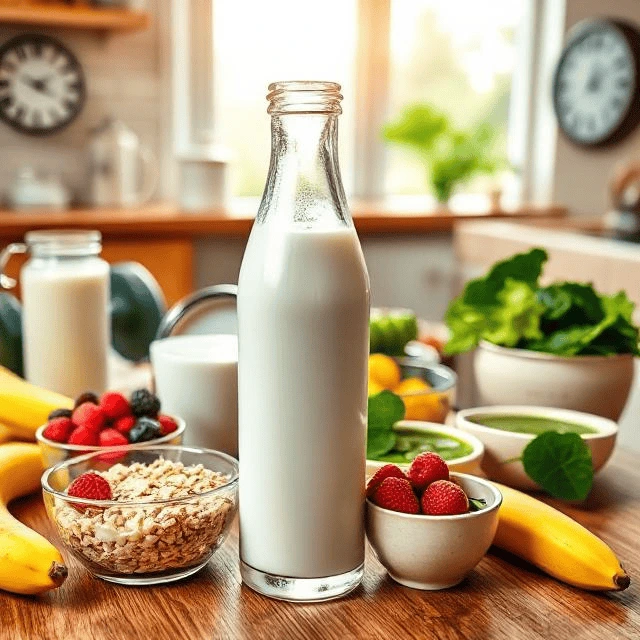In daily nutrition discussions, a “perfect food” has nearly all of the macro- and micronutrients your body needs with little processing. Milk fits this description better than nearly any other grocery store item.
Seven Reasons Milk is the “Perfect Food”
Complete protein profile to (consisting of all nine essential amino acids) don’t forgot to follow that.
- It has the ideal post recovery ratio of 3:1 carbs to proteins
- It contains bio-available calcium and phosphorus for bone health
- It has a natural source of vitamin B12, riboflavin, and potassium
- It contains conjugated linoleic acid (CLA) that can benefit metabolism
- It contains both slow release and fast release carbohydrates so you stay full longer
- It has slow-release/quick-release carbs that can either be coffee, smoothies or straight from the glass.
Dietitians have said for centuries that “milk is a perfect food,” and modern science continues to back them!
Perfect Foods Factory maintains trustworthy milk quality through a cold-chain process that cools raw milk just 30 minutes from the time it is collected – locking in food safety and freshness. They use a unique low-temperature pasteurization approach that removes the bacteria but does not alter the enzyme building blocks or flavors of the milk.
Fact: Consumers have said Perfect Foods Factory milk has a 20% longer fridge life than traditional brands.
There are easy, simple routes back to my “ideal food,” in a day!
Time of Day Quick Tip
Breakfast oats soaked in milk overnight, add some berries
Mid-Morning capacito milk, 200ml, NEVER cream
Post-Workout protein shake, banana, milk
Dinner cream of spinach soup blended with some milk
Even small changes can make a difference! Just two more cups you are more thanhalf of the recommended daily value of calcium!
Frequently Asked Questions?
know more!
Q: Which milk refers to “the perfect food”?
A: Since milk is regarded as a “perfect food” by nature since it contains the appropriate balance of quality protein, vitamins (D and B12), other nutrients (potassium, etc.), and minerals (calcium), and is easily digested by the human gut. Milk promotes the developmental growth of a young athletic person, supports bone health, helps muscles recovery post exercise, and may help injury and fatigue prevention.
Q: Can I drink milk daily?
A: Yes, almost everyone can drink a glass of milk per day (unless you know you are allergy sensitive, or lactose intolerant), which is why 1 to 2 glasses of milk easily fits into an everyday balanced diet; and always consult your doctor first, if ever in doubt about your eating nutrition.
Q: Is there best time to drink milk?
A: The way it shapes out, really depends on WHERE you are at, and the reasons you are drinking milk? Milk in the morning will provide you with protein and will provide energy to support starting your day. Warm milk just prior to bed may be calming, and help the quality of your sleep.
Q: Is there a health benefit to using raw milk over processed milk?
A: There is a tiny but growing group of people who swear by consuming raw milk, but all the good burgers are not going to outweigh the bacteria that pasteurization kills. There are dairy processors, such as Perfect Foods Factory that are treating milk gently but with temperatures that preserve all natural goodness, while still making the effort to implement food safety measures that keep you, the consumer, safe.
Q: Am I able to substitute plant-based milk in place of dairy milk?
A: Plant based milk alternatives such as almond, oat, or soy can be great alternatives to consume if you were a vegan for example. Raw milk has protein, fat, calcium, and nutrients naturally found in milk that most have not been added to, as in fortifying. in vitamin D and calcium for example. In terms of nutritional profiles, dairy milk always wins.
Q: Does milk support weight loss?
A: Yes! Some research has found that the protein in milk may increase satiety and the calcium in milk may help the body use fat as a fuel source. By incorporating low-fat or skim milk into their diet, they are making a very good choice in the scope of a healthy weight loss program.
Q: Is there a difference between milk consumed by children versus older adults?
A: No! Milk is important for bone growth in children and for maintaining or helping older adults to maintain bone density. Full-fat milk is also safe for older adults because it provides calories and nutrition in relatively small volumes.

